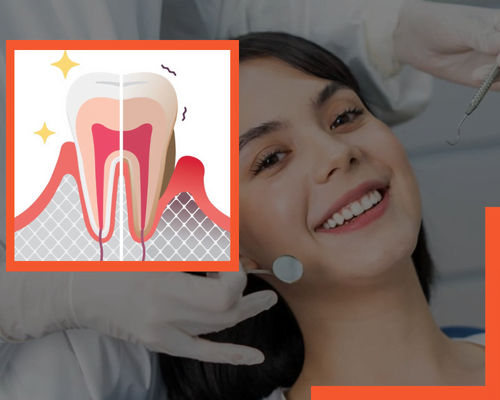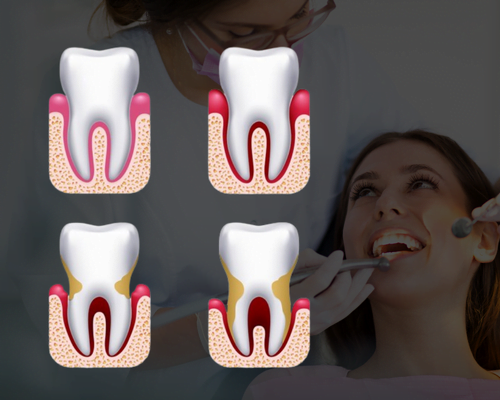Gum disease is a prevalent oral health issue affecting millions of people worldwide. It’s crucial to understand its causes, symptoms, and effective treatment options for maintaining optimal oral hygiene. In this article, we’ll delve into the depths of gum disease and explore ways to prevent, diagnose, and treat it effectively.
Introduction
Gum disease, also known as periodontal disease, is an infection of the gums that can lead to serious dental problems if left untreated. It’s essential to be aware of the causes and symptoms to address it promptly.
Causes of Gum Disease
Poor Oral Hygiene
Inadequate brushing and flossing allow plaque to build up, leading to gum inflammation and disease.
Smoking and Tobacco Use
Tobacco users are at a higher risk of developing gum disease due to reduced blood flow and compromised immune function.
Genetics
Genetic factors can make some individuals more susceptible to gum disease, emphasizing the importance of proactive oral care.
Signs and Symptoms
Bleeding Gums
One of the earliest signs, bleeding gums during brushing or flossing, indicates potential gum disease.
Persistent Bad Breath
Chronic bad breath may be a result of the bacteria causing gum disease.
Receding Gums
Gums that pull away from teeth could be a sign of advanced gum disease, requiring immediate attention.
Types of Gum Disease
Gingivitis
The initial stage of gum disease, characterized by inflammation and bleeding gums.
Periodontitis
Advanced gum disease, leading to the destruction of the bone and tissues supporting the teeth.
Importance of Early Detection
Early detection is crucial for preventing the progression of gum disease and avoiding severe complications.
Why Choose Dr. Anuradha Bose Dental Clinic
Trustworthy Dental Care – Gum Disease Treatment in Newtown
Welcome to Dr. Anuradha Bose Dental Clinic in Newtown! We’re the go-to place for taking care of your smile, especially when it comes to treating gum disease. Here’s why you should choose us:
- Expert Care:
- Dr. Anuradha Bose, our main dentist, knows all about gum disease treatment. You’re in good hands!
- Personalized for You:
- We know every smile is different. Our way of treating gum disease is made just for you, so you get the care you need.
- Honest and Clear:
- We believe in being upfront. We’ll always keep you in the loop about your gum disease treatment.
- High-Tech Tools:
- Our clinic uses the latest in dental tech. This helps make treating gum disease faster and better.
- Everything Your Smile Needs:
- We do more than just treat gum disease. From keeping your smile healthy to making it look great, we’ve got you covered.
- You Come First:
- We want you to feel comfy. Our friendly team works hard to make sure every visit is easy and positive.
So, pick Dr. Anuradha Bose Dental Clinic in Newtown for gum disease treatment. Let’s make your smile the happiest and healthiest it can be. Schedule your visit today!
 Professional Gum Disease Diagnosis
Professional Gum Disease Diagnosis
Dental Examinations
Regular dental check-ups help identify gum disease in its early stages.
X-rays
X-rays provide a comprehensive view of the teeth and underlying bone, aiding in diagnosis.
Periodontal Probing
Measuring pocket depths around teeth helps determine the extent of gum disease.
At-Home Oral Care
Brushing Techniques
Proper brushing techniques, including gentle circular motions, are essential for gum health.
Flossing Tips
Regular flossing removes plaque from between teeth, preventing gum disease.
Mouthwash Recommendations
Antibacterial mouthwashes can complement oral hygiene efforts, reducing bacteria that cause gum disease.
Professional Treatment Options
Scaling and Root Planing
Deep cleaning procedures remove plaque and tartar from below the gumline.
Antibiotics
Prescription antibiotics may be recommended to control bacterial infection.
Surgical Interventions
In severe cases, surgical procedures may be necessary to restore gum health.
Lifestyle Changes for Prevention
Quitting Smoking
Quitting smoking is a significant step in preventing and managing gum disease.
Healthy Diet Choices
A balanced diet rich in vitamins and minerals supports gum health.
Regular Dental Check-ups
Routine dental visits allow for early detection and intervention.
 Bleeding gum disease treatment
Bleeding gum disease treatment
If you’re dealing with bleeding gums, it could be a sign of gum disease. Here’s a straightforward explanation of how it’s typically treated:
- Good Oral Hygiene:
- What: Brush your teeth thoroughly twice a day with a soft-bristle toothbrush and fluoride toothpaste.
- Why: Proper brushing helps remove plaque, a sticky film of bacteria that can lead to gum disease.
- Regular Flossing:
- What: Floss between your teeth daily to remove plaque from areas your toothbrush can’t reach.
- Why: Flossing helps keep your gums healthy and prevents bleeding.
- Antiseptic Mouthwash:
- What: Use an antiseptic mouthwash to reduce bacteria in your mouth.
- Why: This can assist in preventing and treating gum infections.
- Professional Dental Cleaning:
- What: Visit your dentist for a professional cleaning.
- Why: Dentists can remove built-up plaque and tartar, addressing the root cause of bleeding gums.
- Scaling and Root Planing:
- What: Deep cleaning of the teeth, including the roots, to remove accumulated plaque and tartar.
- Why: This is often recommended for more advanced cases of gum disease to promote healing.
- Antibiotics:
- What: Your dentist may prescribe antibiotics, either topical or oral.
- Why: Antibiotics can help control bacterial infection and aid in gum disease treatment.
- Lifestyle Changes:
- What: Quit smoking if you smoke and manage stress.
- Why: Smoking and stress can worsen gum disease; quitting and stress management support overall gum health.
- Healthy Diet:
- What: Maintain a balanced diet rich in fruits and vegetables.
- Why: Proper nutrition supports your overall oral health, including your gums.
Canine Gum disease Treatment
Treatment for canine gum disease, also known as periodontal disease in dogs, is crucial to ensure their overall health and well-being. Here’s a simple breakdown of canine gum disease treatment:
- Professional Dental Cleaning:
- What: A veterinarian will perform a thorough dental cleaning under anesthesia.
- Why: To remove plaque and tartar buildup, especially below the gumline.
- Dental X-Rays:
- What: X-rays may be taken to assess the extent of dental disease, including hidden issues below the gumline.
- Why: To identify any underlying problems that may not be visible during a standard examination.
- Extraction of Diseased Teeth:
- What: Severely affected teeth may need to be extracted.
- Why: To eliminate sources of infection and prevent further pain or complications.
- Antibiotics:
- What: Antibiotics may be prescribed to combat bacterial infections associated with gum disease.
- Why: To control and eliminate infection.
- Dental Home Care:
- What: Implement a dental care routine at home, which may include brushing your dog’s teeth, providing dental chews, or using oral rinses.
- Why: To maintain oral hygiene and prevent the recurrence of gum disease.
- Special Diets:
- What: Your vet might recommend special dental diets designed to reduce plaque and tartar.
- Why: These diets often have a texture or formulation that helps keep teeth cleaner.
- Regular Vet Check-ups:
- What: Schedule regular dental check-ups with your veterinarian.
- Why: Regular monitoring helps catch dental issues early and ensures ongoing dental health.
- Lifestyle Adjustments:
- What: Encourage chewing on dental toys and provide suitable items to help keep teeth clean.
- Why: Chewing aids in maintaining dental health by reducing plaque buildup.
It’s essential to consult with your veterinarian if you notice signs of gum disease in your dog, such as bad breath, swollen gums, or difficulty eating. Early intervention and consistent dental care are key to preventing and managing canine gum disease.
Chronic Gum Disease Treatment
The treatment for chronic gum disease, also known as advanced periodontitis, involves comprehensive measures to address the infection and prevent further damage. Here’s a simplified explanation:
- Deep Cleaning (Scaling and Root Planing):
- What: Thorough removal of plaque and tartar, including below the gumline.
- Why: To eliminate bacterial infection and promote healing.
- Periodontal Surgery:
- What: Surgical procedures such as flap surgery or pocket reduction to access and clean deep pockets in the gums.
- Why: To reduce pocket depth and facilitate better oral hygiene.
- Bone Grafts:
- What: Addition of graft material to areas where the bone has been damaged by the disease.
- Why: To stimulate bone regeneration and provide support to teeth.
- Soft Tissue Grafts:
- What: Grafting of tissue to areas with gum recession.
- Why: To reinforce thin or receding gum tissues.
- Guided Tissue Regeneration:
- What: Placement of a barrier to encourage the regeneration of bone and gum tissues.
- Why: To aid in the regrowth of structures damaged by gum disease.
- Antibiotics:
- What: Prescription of antibiotics, either systemic or topical.
- Why: To control bacterial infection, especially if the disease is widespread.
- Lifestyle Changes:
- What: Quit smoking if you smoke and manage stress.
- Why: Smoking and stress can worsen gum disease; quitting and stress management support overall gum health.
- Ongoing Maintenance:
- What: Regular follow-up appointments with the dentist or periodontist.
- Why: To monitor the condition, perform cleanings, and prevent the recurrence of gum disease.
It’s crucial to consult with a dentist or periodontist for an accurate diagnosis and personalized treatment plan. Chronic gum disease requires comprehensive care, and early intervention is key to preventing further damage. Maintaining good oral hygiene practices and attending regular dental check-ups are essential components of successful treatment.
Natural Remedies
Oil Pulling
Oil pulling with coconut or sesame oil can help reduce harmful bacteria in the mouth.
Green Tea
The antioxidants in green tea have anti-inflammatory properties beneficial for gum health.
Aloe Vera
Aloe vera gel can soothe inflamed gums and aid in healing.
The Role of Nutrition
Vitamins and Minerals for Gum Health
Adequate intake of vitamin C, D, and calcium supports overall gum health.
Addressing Gum Disease in Children
Importance of Early Intervention
Teaching children proper oral care habits from an early age prevents gum disease.
Child-Friendly Oral Care
Using age-appropriate dental products and making oral care fun encourages children to develop good habits.
Common Myths about Gum Disease
Debunking Misconceptions
Dispelling common myths helps individuals make informed decisions about their oral health.
Success Stories
Personal accounts of overcoming gum disease inspire others to take proactive steps in their oral care routine.
Conclusion
In conclusion, understanding gum disease is key to maintaining a healthy smile. By adopting proper oral care practices, seeking professional help when needed, and making lifestyle changes, individuals can prevent and manage gum disease effectively.
FAQs
- Can gum disease be reversed with proper oral care?
- Early-stage gum disease (gingivitis) is reversible with good oral hygiene, but advanced cases may require professional intervention.
- Is there a link between gum disease and overall health?
- Yes, gum disease has been linked to various systemic conditions, highlighting the importance of oral health in overall well-being.
- How often should I visit the dentist for check-ups?
- Regular dental check-ups every six months are recommended for early detection of gum disease and other oral issues.
- Are natural remedies effective in treating gum disease?
- While some may offer relief, professional dental care is crucial for treating gum disease effectively.
- Can children develop gum disease?
- Yes, but with proper oral care and early intervention, gum disease in children can be prevented and managed.
6. What sets Dr. Anuradha Bose Dental Clinic apart from others?
- Our clinic distinguishes itself through a combination of expertise, personalized care, and state-of-the-art facilities.
7. Can I resume normal activities immediately after treatment?
- Most patients can resume regular activities soon after treatment, but specific instructions will be provided based on individual cases.
8. How much does laser treatment for gum disease cost in India ?
- The cost of laser treatment for gum disease in India can vary depending on several factors, including the severity of the gum disease, the specific laser technology used, the dentist or periodontist’s expertise, and the location of the dental clinic. The cost range for laser treatment for gum disease in India could be anywhere from INR 10,000 to INR 50,000 or more.
9. What is the best treatment for gum disease ?
The best treatment for gum disease depends on the severity of the condition. Gum disease, also known as periodontal disease, has different stages, ranging from gingivitis (mild inflammation of the gums) to advanced periodontitis (severe damage to the bone and tissues supporting the teeth). Here are common treatments based on the stage of gum disease:
Sure, let’s break it down:
- For Mild Gum Disease (Gingivitis):
- What: Get your teeth professionally cleaned and keep up with regular brushing, flossing, and mouthwash.
- Why: This helps remove the early signs of gum inflammation.
- For Mild to Moderate Gum Disease:
- What: Deep cleaning to remove plaque below the gumline and antibiotics to fight infection.
- Why: This tackles a bit more advanced gum issues and prevents further damage.
- For Severe Gum Disease:
- What: Surgery to reduce pocket depth, bone grafts to replace lost bone, and tissue grafts for gum reinforcement.
- Why: When gum disease is advanced, more intensive treatments are needed to repair damage.
- Ongoing Care:
- What: Regular check-ups and cleanings post-treatment.
- Why: To maintain good oral health and prevent gum disease from coming back.
- Optional Laser Treatment:
- What: Some use lasers to treat gum disease.
- Why: It’s an alternative method to remove bacteria and infected tissue.
In conclusion, Dr. Anuradha Bose Dental Clinic stands as a beacon of excellence in gum disease treatment. Our commitment to personalized care, advanced technology, and positive patient outcomes makes us a trusted choice for optimal oral health.


 Professional Gum Disease Diagnosis
Professional Gum Disease Diagnosis Bleeding gum disease treatment
Bleeding gum disease treatment